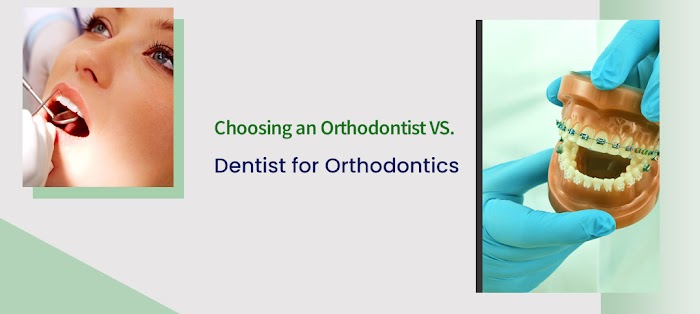
There are different fields in general dentistry, and one such is the field of orthodontics. Patients can get confused most times when it comes to differentiating between the roles of a dentist and an orthodontist.
Basically, both dentists and orthodontists are highly trained professionals who take care of the teeth and mouth generally, but that is where the similarities end. But the common query of a majority of dental patients is the basic difference between an orthodontist and a dentist.
One might ask, what is the difference between a dentist and an orthodontist? And what is the specialization of each field? We have taken the time to explain certain differences using commonly asked questions to guide you on your decision between a dentist and an orthodontist for orthodontia works.
Outlined below are some of the frequently asked questions to get you informed.
 |
| Choosing an Orthodontist VS Dentist for Orthodontics |
1. Is it possible for Dentists to perform orthodontics operations?
Some dentists provide orthodontal services to their patients, but this does not qualify them as orthodontists. Orthodontists are specialists who have been registered by the Dental Board as Orthodontal specialists. They undergo an additional three years of full-time university study to become one.
Dentists, on the other hand, have not undergone this extra 3-year study, and therefore do not have the same experience and level of training an orthodontist has. Although dentists can offer some basic orthodontic services, they are not fully qualified orthodontists.
Orthodontic treatment is quite complex. There are unique variations in factors that are related to growth, muscle and bone structure, and these variations make patients who have similar problems to respond differently during orthodontic treatment. A dentist may encounter problems when this happens. It takes a specialist orthodontist to recognize these different responses and re-chart the treatment course. This is one of the criteria to become qualified as an orthodontist in Croydon or become part of an orthodontist team. Satisfying this process is an important part of orthodontists training and is mandatory.
Being a part of an orthodontist team entails consulting each other and sharing experiences, ideas and knowledge about a patient's treatment, something that dentists rarely do. The 3 years extra training for orthodontists enables them to recognize issues regarding gum and tooth health, diagnose and treat irregularities of the jaw and face, and straighten teeth more than dentists. You can check for the authenticity of orthodontist qualification by visiting the Orthodontist database, or check an orthodontist registrations details with the government regulator for all health practitioners.
2. Dentists before Orthodontists?
Orthodontists are required to have at least 2 years of experience as a dentist, before becoming an orthodontist. This exposes them to the general hands-on experience in general dentistry like teeth cleaning, teeth filling and teeth extractions.
Dentists and potential orthodontists must complete a four or five years degree course in dentistry in the University to become qualified as a dentist and acquire a Bachelors degree in Dental Surgery. After 2 years of dental clinic experience, those who wish to become orthodontists can return to the university for the three years orthodontist specialist degree. If you are successful with your Membership Orthodontics examination, you are qualified to become an orthodontist in Croydon.
Orthodontists are trained professionals who are specialized in straightening teeth and treating all problems associated with the growth and development of the jaw in children and adults. There are various colleges of dentistry and orthodontics scattered all over the UK. There is the UK College of Dentistry where residents complete their dentistry degree and advance in the area of orthodontics.
3. Who do I need to visit first between a dentist and an orthodontist?
In some places, orthodontists do not need a referral from a dentist. Anyone can see an orthodontist. There are orthodontists near Croydon, and it is usually a good idea for parents to take their children to see one when the child is about 7 - 8 years. The orthodontist will check the child to observe the progress of their adult teeth. If there is any problem, the specialist orthodontist will recommend treatment. Your orthodontist can also review the child in 6 -12 months to check for any problem that may arise. This is important because any problem discovered will be easy to treat, as they can be difficult when the child approaches adulthood.
Some dental problems require the services of a general dentist, like teeth filling, tooth extraction and general teeth checkup. There are some other problems like checking for the progress of clear aligners and problem of an impacted tooth that require the services of an orthodontist — knowing which of the problem you have and which specialist you should visit can save you unnecessary stress.
Even if you and your family have a special dentist in Croydon, there is still the need to book appointment to carry on with your dental hygiene.
4. Do Orthodontists carry out surgery?
Orthodontists do not usually perform surgeries, although oral surgery can come in different forms. Extractions are usually the common types of surgery required by orthodontic patients, at which the patients will be referred to their dentist or oral surgeon in complex cases. The extraction can be at a dental surgery, hospital or day surgery. It all depends on the patient and the extraction.
 |
| Dentist And Patient |
Major structural problems of the jaw like impacted teeth can require the services of a periodontist or an oral and maxillofacial surgeon. Surgeries are all dependent on the severity of the problem.
5. Braces: Dentist Vs. Orthodontist
An orthodontist is the one specialized with moving of the teeth and proper straightening using braces. It is the duty of an orthodontist to handle braces related issues and not the dentist. On the other hand, dentists are practitioners concerned with different aspects of dentistry but lack the expertise achieved by specialist orthodontists in the extra 3 years of study.
During this extra three years of study for orthodontics, they are exposed to various scenarios highlighting brace related issues. This is why they come out highly specialized in handling every problem that concerns braces on a daily basis. Dentists may end up having only a handful of clients with braces problem out of other general teeth problems.
There are orthodontists that will provide you with efficient orthodontal treatment when it comes to braces, improvement and handling of any issue that may arise from its use.
Conclusion
Both orthodontists and dentists are skilled professionals. However, a major difference between the two remains that orthodontists are part of specialist orthodontist teams who work together. Dentists do not usually consult each other or work in teams, but they provide you with reliable treatment and consultation.
At Smile 4 U Dental Practice, you can get the best dental health you require by simply booking an appointment with us. Contact us today to get a specialist orthodontist near Croydonand get your teeth straightened using invisalign braces.


0 Comments: